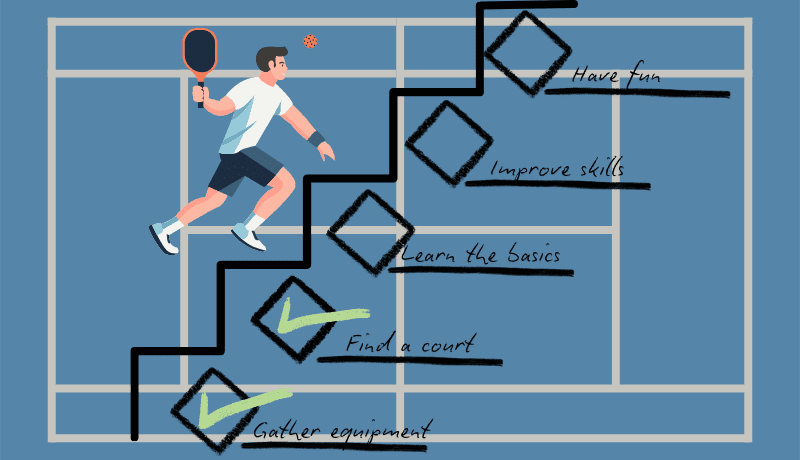The Most Famous Personal Productivity List
You have probably heard of the book “The 7 Habits of Highly Effective People”. Let's look at the list of these habits and learn about ways to deepen them.

The topic of personal productivity is quite close to me. I started getting interested in it somewhere around 2010. Since then, I have read several excellent books, set up a system with tasks, deadlines, notifications, and more. Now, I am writing this text, and on the second monitor, I have the Todoist app open. I check it numerous times per day. When the Todoist authors were sending out the annual achievement letter, I consistently ranked in the top 1% of users with the highest number of completed tasks. As of now, after nine years of using the application, I have completed 57,986 tasks.
In the field of personal productivity, there is a very famous book by Stephen Covey, 'The 7 Habits of Highly Effective People' [1]. Since we have the number “seven”, it means there is enumeration, a list of habits. Let's look at this list. This won’t be the in-depth review, since each habit is too deep to be adequately described in a few paragraphs.
❗️ One might say this article is unfinished. I want to invite you to help me complete it. I have recommended books necessary for developing certain skills and left a note (❓📖) in places where I need your help! Contact me in the most convenient way for you to recommend the relevant books.
The book “The 7 Habits of Highly Effective People” itself can be read today if you are interested in a book about personal productivity. I read it in 2021, much later than other similar books. At that time, I thought it had suffered the fate of books like “Code Complete” and “Clean Code”. Often these days, I hear from developers that the things written in these books are entirely obvious. Yes and no. It's just that these books, during their existence, had a strong influence on the development culture, saturating it.
With the book “The 7 Habits of Highly Effective People”, things turned out differently. I expected before reading that I would just respectfully and for education's sake listen to things everyone already knew. Now I don't remember the details, but the feeling was that I got acquainted with many fresh thoughts.
The introduction dragged on, it's time to get down to business. So, the list:
- Be proactive. It’s about acting and thinking several steps forward. ❓📖
- Begin with the end in mind. This means not the goal of a specific project, but an ideal image of yourself. If you take on something, will you get closer to whom you want to be? ❓📖
- Put first things first. This near tautology suggests choosing from the available actions those that will have the greatest effect. Do you know which nearest action will have the most positive long-term impact on your life? It's difficult to figure out, but there is a bone-rattling methodology. It's described in the book “The Logical Thinking Process” [2].
- Think win/win. Design cooperation so that it is mutually beneficial. Jim Camp in his book “Start with NO…” [3] strongly critiques this habit. However, it seems to me he critiques its inept implementation, turning into a loose/win.
- Seek first to understand, then to be understood. This is about the ability to listen and speak the language of the interlocutor. The habit reminds me of Mark Goulston's book “Just Listen” [4].
- Synergize. That is, achieving such interactions where the total contribution becomes greater than the sum of the individual contributions. ❓📖
- Sharpen the saw. Here the author suggests carefully developing four spheres of your life: mental, physical (❓📖), social/emotional (❓📖), and spiritual (❓📖). Only for the mental sphere, I can recommend a book. The book is called “A Mind for Numbers” [5]. It can be recommended both to beginning students and those who wish to study outside of universities.
If you know what can replace ❓📖, write to me in a convenient place for you. Let's complete the article with the collective wisdom of readers.
Personal productivity is good, but it should be approached with caution. Our time is known for the fact that highly educated graduates cannot find a job for a long time. I can't say I have good statistical data, but the image of a graduate living with their parents and failing to start a career keeps appearing in my field of vision.
I write this because it is quite possible to set up a mighty personal productivity system for yourself and find that there is nowhere to apply it. That is, the groups and organizations in which a person participates must also be ready to accept a highly productive person.
Otherwise, it all again boils down to the problem of local optimization. That is, some part of the organization works very well, but this does not reflect at all on the work of the whole organization. All the super productivity of this part goes down the drain or, at best, settles in stocks, whether physical, intellectual, and others.
List of references:
[1] Stephen Covey “The 7 Habits of Highly Effective People: Powerful Lessons in Personal Change” ISBN 978-1-47113-182-0
[2] William Dettmer “The Logical Thinking Process: A Systems Approach to Complex Problem Solving” ISBN 978-0873897235
[3] Jim Camp “Start with NO... The Negotiating Tools that the Pros Don't Want You to Know” ISBN 978-0609608005
[4] Mark Goulston “Just Listen: Discover the Secret to Getting Through to Absolutely Anyone” ISBN 978-0814436479
[5] Barbara Oakley “A Mind for Numbers: How to Excel at Math and Science (Even If You Flunked Algebra)” ISBN 978-0-399-16524-5



